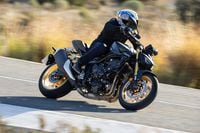It’s been 25 years since Honda’s massively popular 600cc Hornet wheelied onto European tarmac, so when word got out a couple of years ago that a new Hornet was in development the buzz (sorry) around the internet was palpable. The first and second-gen Hornets were almost universally beloved for their light weight, revvy characterful engine, and uh, down-to-earth price tags. Fun, practical, and cheap? It’s no wonder crowds of riders signed up to own one. And while the naked-bike segment has evolved tremendously in the ensuing years, a midsize model with those same characteristics along with the reliability and build quality Honda’s known for—at the right price—might still put up a good fight against its Trident 660 and MT-07 rivals.
Sure enough, Honda pulled the wraps off its long-anticipated CB750 Hornet at the 2022 Intermot show in Germany, and it had all the goods we could hope for: a rollicking 91 hp twin engine (not an inline-four like the old model), a robust menu of standard features, and a better-than-expected electronics package. The compact 755cc Unicam eight-valve parallel-twin engine was entirely new, as was the diamond steel frame, and the bike sported throttle-by-wire, ABS, four ride modes, traction and wheelie control, a six-speed transmission, and more.
Initial reports praised its fat midrange, agility, and unique sound (for a parallel twin). It weighed less than 420 pounds, and for a naked middleweight, the price was right; less than 8,000 euro (about $8,500 USD).
Related: 2024 Honda XL750 Transalp First Look Preview
You can bet plenty of US riders immediately thought, “Great, North America will get it next year.” And really, that didn’t seem like an outlandish idea. The bike had been teased since at least 2021, beginning with computer illustrations and then more fleshed-out reveals of a concept version; it had now become a familiar formula, with Honda then usually releasing a full production model in Europe, followed a year later with entry into the North American market. But here we are at the end of 2023 and many of the 2024 US models have already been announced, including the reborn 2024 Transalp model, which—it almost feels like a slap in the face—uses the same exact 755cc engine as the Hornet. A bike with the same drivetrain as the Hornet, that wasn’t expected in the US at all this year, and yet…
Hello, Honda?
As we said, the engine is all-new, with the parallel twin using Honda’s latest vortex airflow ducting to improve intake flow in the low-end and midrange. Peak power is 90.5 hp at 9,500 rpm, with max torque of 55.3 lb.-ft. coming on at 7,250 rpm. The Hornet’s 755cc mill also uses a 270-degree crank for an uneven firing interval that injects more character to its delivery as well as its sound.
To be fair, the Transalp’s mill is ever so slightly different, with the airbox inlets being longer to give it more midrange, and its back wheel is also bigger, resulting in slightly different gear ratios, but you get the point: The 2024 Transalp is here in the US, and the Hornet is not. We can feel the sting (uh, sorry again).
Related: Honda 599 Hornet
According to Honda literature, the CB750 Hornet was developed based on the concept of a “high-performance middleweight sports model that enables a brisk ride on both winding roads and city streets,” with a “sporty yet stable ride,” and “full range of advanced features.” That sounds an awful lot like a bike that US riders would be totally down with.
Then again, maybe Honda is just keeping a close eye on the market numbers. Over the last few years, the off-road and adventure segments have absolutely exploded in America, while middleweight sportbikes…well, not so much. That’s likely why the Transalp came early, but Honda is also fully invested in the naked-bike segment—the CB300R, CB500F, CB650F, and CB1000R are here in the States—and a CB750 would make sense, especially if Honda swapped it in for the inline-four CB650F and hit the MSRP just right.
The rumors out of Japan suggest a faired CBR750R as well as a retro-flavored CB750 Hawk model may be in the pipeline, but for now, we’d be happy with a Hornet—any Hornet.










/cloudfront-us-east-1.images.arcpublishing.com/octane/XGRZRKYLOFCLJKU2XA3QIMBBT4.jpg)
/cloudfront-us-east-1.images.arcpublishing.com/octane/GJGZL7QC7NBB3ISCOHPEJZMF5U.jpg)
/cloudfront-us-east-1.images.arcpublishing.com/octane/5PPDDG3KD5EKZHYICZMUIGPFAE.jpg)
/cloudfront-us-east-1.images.arcpublishing.com/octane/H3XLVE2LBFC6PCHFFNDQ2XX7V4.jpg)
/cloudfront-us-east-1.images.arcpublishing.com/octane/GHG2HDAGX5ANDBZIDPFSTMURII.jpg)
/cloudfront-us-east-1.images.arcpublishing.com/octane/XB5BD7GFKBC6FFLLMMNKZCGRBA.jpg)
/cloudfront-us-east-1.images.arcpublishing.com/octane/G4MG6OUCJNBSHIS2MVVOTPX65E.jpg)
/cloudfront-us-east-1.images.arcpublishing.com/octane/IIGGWFOTOJGB7DB6DGBXCCMTDY.jpg)
/cloudfront-us-east-1.images.arcpublishing.com/octane/QSTCM6AVEZA5JJBUXNIQ3DSOF4.jpg)
/cloudfront-us-east-1.images.arcpublishing.com/octane/U4I7G625B5DMLF2DVIJDFZVV6M.jpg)
/cloudfront-us-east-1.images.arcpublishing.com/octane/B6XD6LS6IVCQPIU6HXDJSM3FHY.jpg)
/cloudfront-us-east-1.images.arcpublishing.com/octane/ICL63FEDDRDTTMINYICCEYGMDA.jpg)
/cloudfront-us-east-1.images.arcpublishing.com/octane/FCGZHQXRBZFLBAPC5SDIQLVF4I.jpg)
/cloudfront-us-east-1.images.arcpublishing.com/octane/WNOB6LDOIFFHJKPSVIWDYUGOPM.jpg)

/cloudfront-us-east-1.images.arcpublishing.com/octane/X33NU3E525ECRHXLNUJN2FTRKI.jpg)
/cloudfront-us-east-1.images.arcpublishing.com/octane/6KKT5NNL2JAVBOXMZYS5ZO76YA.jpg)
/cloudfront-us-east-1.images.arcpublishing.com/octane/J5RKG5O455GMPGQRF2OG6LRT7A.jpg)
/cloudfront-us-east-1.images.arcpublishing.com/octane/GX2CIZKQVRH2TATDM26KFG2DAE.jpg)
/cloudfront-us-east-1.images.arcpublishing.com/octane/ZWIDYSAKQZHD5BHREMQILXJCGM.jpg)
/cloudfront-us-east-1.images.arcpublishing.com/octane/CYUHJZCTSJCH3MRAQEIKXK7SCQ.jpg)
/cloudfront-us-east-1.images.arcpublishing.com/octane/LKOFINY56FCXJCANJ5M7ZDQUBY.jpg)
/cloudfront-us-east-1.images.arcpublishing.com/octane/4NBPDACMWJH63JQYJVK3QRBDZI.jpg)
/cloudfront-us-east-1.images.arcpublishing.com/octane/KKHQHRR3FJGX7H2IPU6RALMWG4.jpg)

/cloudfront-us-east-1.images.arcpublishing.com/octane/5IOFS5JAE5FOXMNA23ZRAVVYUU.jpg)
/cloudfront-us-east-1.images.arcpublishing.com/octane/CGXQ3O2VVJF7PGTYR3QICTLDLM.jpg)

/cloudfront-us-east-1.images.arcpublishing.com/octane/OQVCJOABCFC5NBEF2KIGRCV3XA.jpg)
/cloudfront-us-east-1.images.arcpublishing.com/octane/OPVQ7R4EFNCLRDPSQT4FBZCS2A.jpg)